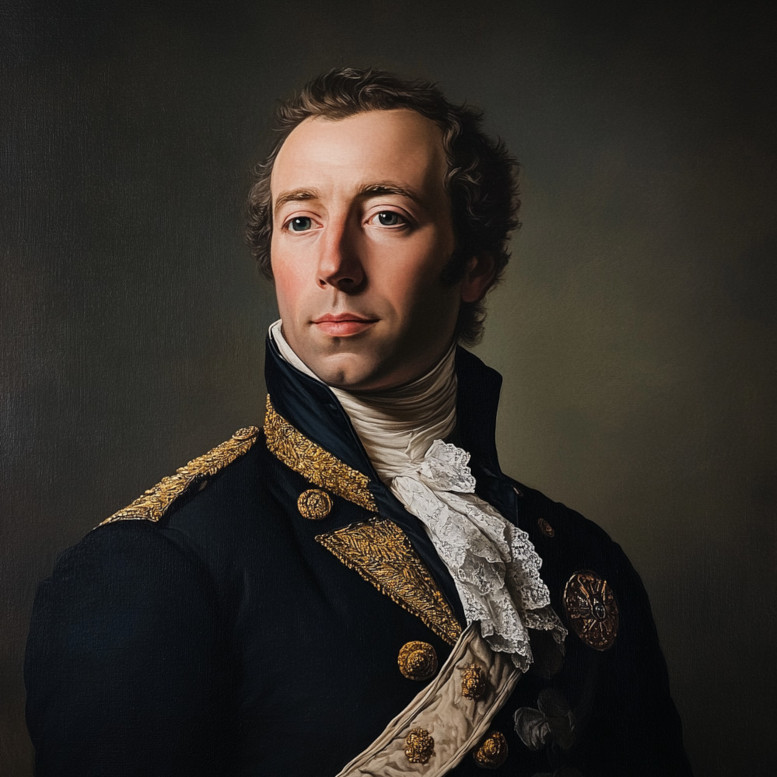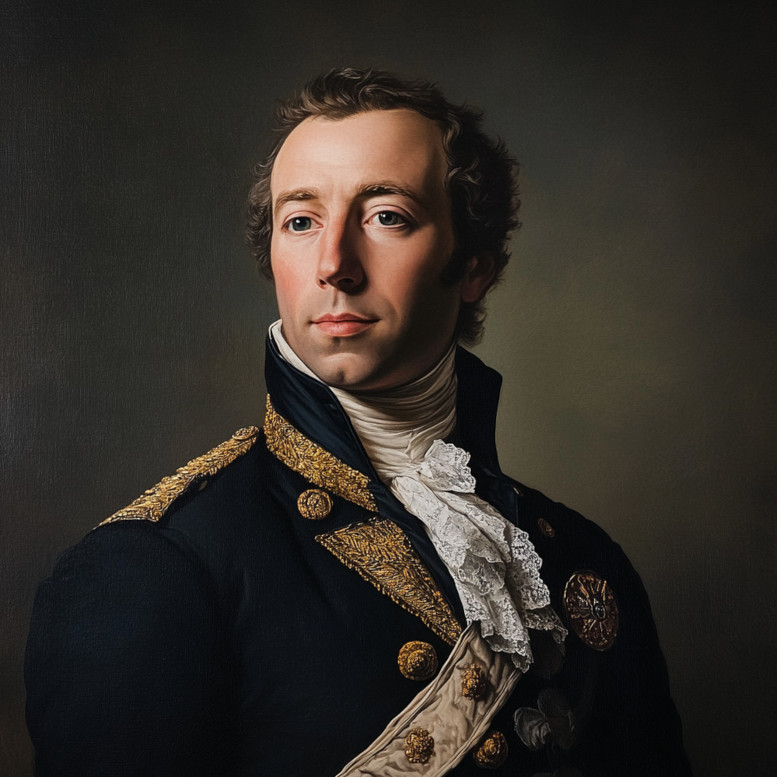


The Marquis de Lafayette (1757–1834), born Marie-Joseph Paul Yves Roch Gilbert du Motier, was a French aristocrat, military officer, and revolutionary leader who played a crucial role in both the American Revolutionary War and the French Revolution. Known as the "Hero of Two Worlds," Lafayette's dedication to the cause of liberty and his strong belief in democratic ideals made him a significant figure in the history of both France and the United States. His friendship with key American figures, including George Washington, and his efforts to bridge the ideals of the American and French revolutions have solidified his legacy as a champion of freedom.
Early Life and Background
Birth and Family Background: Lafayette was born on September 6, 1757, at the Château de Chavaniac, in the Auvergne region of France. He belonged to a noble family with a long history of military service. His father was killed in battle when Lafayette was just two years old, and his mother passed away when he was twelve, leaving him an orphan with a vast inheritance. He was raised by his grandmother and educated in Paris, where he was groomed for a career in the military, as was expected of young nobles.
Marriage and Entry into Court Life: At the age of 16, Lafayette married Adrienne de Noailles, a member of one of France's most influential families. His marriage brought him closer to the French court, but Lafayette was more interested in military service and adventure than in the intrigues of Versailles.
Involvement in the American Revolution
Interest in the American Cause: Lafayette was inspired by the ideals of the American Revolution, particularly the fight for liberty and independence from Britain. At the age of 19, despite having little military experience and against the wishes of the French government, he purchased a ship and set sail for America in 1777 to join the revolutionaries. His decision was motivated by a deep commitment to the cause of freedom and a desire to challenge the British, France's longtime rival.
Service in the Continental Army: Upon his arrival in Philadelphia, Lafayette offered his services to the Continental Congress, which appointed him as a major general in the Continental Army. Though he initially served without pay, Lafayette quickly proved his value as a military leader. His first major action was at the Battle of Brandywine in September 1777, where he was wounded but demonstrated great bravery.
Lafayette's close relationship with General George Washington began during this time. Washington, who became a father figure to Lafayette, entrusted him with important commands and missions. Lafayette's most significant contributions included his leadership during the winter at Valley Forge, his role in the battles of Monmouth and Rhode Island, and his efforts in rallying French support for the American cause.
French Support and the Siege of Yorktown: Lafayette's influence in France was instrumental in securing French military and financial support for the American Revolution. His efforts culminated in the arrival of French troops under General Rochambeau, who joined forces with Washington's army. Lafayette played a key role in the Siege of Yorktown in 1781, where the combined American and French forces defeated the British, effectively ending the war and securing American independence.
Return to France and the French Revolution
Advocate for Reform: After the American Revolution, Lafayette returned to France, where he was hailed as a hero. Inspired by the democratic ideals he had encountered in America, Lafayette became a leading advocate for political and social reforms in France. He joined the Society of the Friends of the Blacks, which opposed slavery, and worked to promote constitutional government.
Role in the French Revolution: As the French Revolution began in 1789, Lafayette became a central figure in the early stages of the revolution. He was elected to the Estates-General as a representative of the nobility and later served as vice president of the National Assembly. Lafayette drafted the Declaration of the Rights of Man and of the Citizen, a document that reflected his commitment to individual liberty and the principles of the American Revolution.
Lafayette was appointed commander of the National Guard, a new military force created to maintain order during the revolution. He attempted to steer a moderate course between the monarchy and the increasingly radical factions of the revolution. However, his efforts to protect the king while supporting constitutional reform made him enemies on both sides.
Fall from Power and Imprisonment: As the revolution became more radical, Lafayette's position became increasingly precarious. In 1792, after a failed attempt to quell the growing radicalism, he was forced to flee France. He was captured by Austrian forces and imprisoned for several years, enduring harsh conditions. During his imprisonment, his wife, Adrienne, and their children also suffered, with Adrienne herself being imprisoned during the Reign of Terror.
Later Life and Legacy
Release and Return to France: Lafayette was released from prison in 1797 after the intervention of Napoleon Bonaparte, who was then rising to power in France. Although he returned to France, Lafayette did not support Napoleon's authoritarian rule and chose to live quietly on his estates during the Napoleonic era. He re-entered public life during the Bourbon Restoration but remained a steadfast advocate for liberal constitutionalism.
Role in the July Revolution (1830): In 1830, during the July Revolution, Lafayette once again played a key role in shaping France's future. He supported the constitutional monarchy of Louis-Philippe and helped ensure a relatively peaceful transition of power. However, he continued to advocate for greater political freedoms and was critical of Louis-Philippe's increasingly conservative policies.
Visit to the United States (1824-1825): In 1824, Lafayette made a triumphant return to the United States as the "nation's guest" to celebrate the upcoming 50th anniversary of the American Revolution. He was warmly received in all 24 states of the young republic, and his visit was marked by parades, celebrations, and the granting of honorary citizenship. His return solidified his status as a beloved figure in American history.
Death: Lafayette died on May 20, 1834, in Paris, at the age of 76. He was buried in the Picpus Cemetery in Paris, under soil brought from the battlefield of Bunker Hill, where he had fought during the American Revolution. His death was widely mourned, and he was honored in both France and the United States for his contributions to the cause of liberty.
Legacy
Hero of Two Worlds: Lafayette's legacy as the "Hero of Two Worlds" reflects his pivotal role in both the American and French revolutions. He is remembered as a champion of liberty, democracy, and human rights, and his influence can be seen in the political developments of both France and the United States.
Namesakes and Memorials: Lafayette's legacy is honored in numerous ways. Many towns, cities, counties, and streets in the United States are named after him, reflecting the deep respect and gratitude Americans have for his contributions to their independence. The Marquis de Lafayette's name is also inscribed on the Arc de Triomphe in Paris, and his statue stands in many cities around the world.
Symbol of Franco-American Friendship: Lafayette's enduring friendship with the United States and his efforts to strengthen ties between France and America have made him a symbol of Franco-American friendship. His life and legacy continue to be celebrated as a testament to the shared values of liberty and democracy that unite the two nations.
The Marquis de Lafayette was a remarkable figure whose dedication to the cause of freedom and human rights left an indelible mark on history. His contributions to the American Revolutionary War and his role in the early stages of the French Revolution earned him the admiration of people on both sides of the Atlantic. Lafayette's legacy as a champion of liberty, his commitment to democratic ideals, and his lifelong efforts to promote the principles of justice and equality ensure that he will always be remembered as one of history's great heroes.

We use cookies
We use cookies and other tracking technologies to improve your browsing experience on our website, to show you personalized content and targeted ads, to analyze our website traffic, and to understand where our visitors are coming from. Privacy Policy.